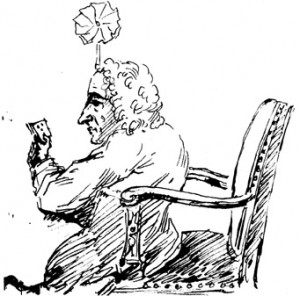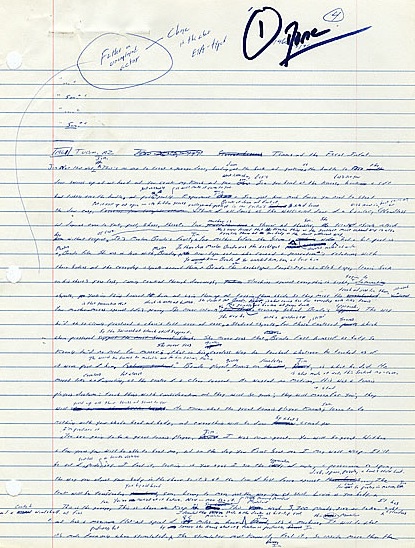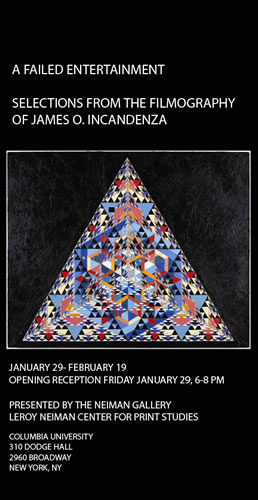David Foster Wallace’s undergrad thesis
 Ok, the book length interview was interesting, and the uncompleted final novel in near-form makes sense (and is compelling, even in its incompleteness), but this, this, is exploitation, and a bad idea:
Ok, the book length interview was interesting, and the uncompleted final novel in near-form makes sense (and is compelling, even in its incompleteness), but this, this, is exploitation, and a bad idea:
Columbia University Press is publishing David Foster Wallace’s undergrad thesis next year? [more info at GalleyCat].
Undergrad thesis? I’m sorry, I love the man, and I am interested in marginalia of great minds, but this to me seems not only too much, but just incorrect. Undergrad papers, particularly ones called things like Fate, Time, and Language: An Essay on Free Will, are almost always embarrassing, and even if they have some merit, don’t really belong in a body of work, unless, you know, the author is alive and willing to OK that thing to come into the world. It hadn’t cropped up since his college years for a reason.
Though I am sure I will purchase and read it (as seems their point here), I think this is a big shame on you waiting to happen. God knows if anyone ever saw what I wrote as undergrad I’d want a fork in the eye, even if I was gone. I can’t imagine that there are many who wouldn’t. Clearly, from the design of the cover of this, these people have no taste. Let a man rest.
Trying to Review the Lipsky/Wallace Book
Although Of Course You End Up Becoming Yourself: A Road Trip with David Foster Wallace
by David Lipsky (Available now from Broadway Books)
I’m trying to write a full review of this book right now, but it’s proving difficult.
First, I must admit that unlike many of my literary colleagues, I am not and never have been a fan of DFW’s writing, so my reading of this text is biased accordingly. I actually only requested a copy of this book for review because so many people I respect recommended it, and because I figured that perhaps by reading it I might be seduced into reconsidering my position.
 Unfortunately, it didn’t really change my opinion or offer any compelling reason to reconsider Wallace’s work. (Except for maybe Broom of the System, which Wallace seems to have come to dislike because of the heavy theoretical influence, which is actually the reason I think I would probably like it).
Unfortunately, it didn’t really change my opinion or offer any compelling reason to reconsider Wallace’s work. (Except for maybe Broom of the System, which Wallace seems to have come to dislike because of the heavy theoretical influence, which is actually the reason I think I would probably like it).
Going back to this thing about me not being a fan, I think that’s really important. If, for instance, someone were to come out with a posthumous book-length interview transcription with Alain Robbe-Grillet or Gilles Deleuze, I would savor every line in much the same way I sense others savor these lines. But for a reader who isn’t already in love with DFW, the book isn’t that appealing. I found it uninterestingly repetitive, and I got an uneasy “someone trying to capitalize on the death of a famous person” feeling from it. I mean there are these parts where DFW asks Lipsky not to include something in the interview and there it is on the page, which sort of feels icky – but at the same time it works to give us a more well-rounded picture of DFW – but then again, dude was a real dude, not a “well-rounded character.”
Also, it made me feel really, really bad for DFW. It made him seem so sad, so lonely. Here’s a couple lines that, for me, characterize the overarching sentiment of the book, this is DFW speaking:
That story at the end of [Girl With Curios Hair], which not a lot of people like, was really meant to be extremely sad. And to sort of be a kind of suicide note. And I think by the time I got to the end of that story, I figured I wasn’t going to write anymore. (61)
I just don’t know about this book.
Have you read it? What did you think?
May 20th, 2010 / 4:30 pm
Slate is claiming an exclusive on this list of “The words David Foster Wallace circled in his dictionary.” So if that’s something you’d like to know about, you can know about it now.
Critics on Criticism: Dryden and Pope on the Evils of Hating, Loving Parts
 Apparently something about the Restoration, after all the Charleses and Jameses and Cromwells and who is Catholic and who is Anglican or Puritan, got poets to thinking about the whole versus the part, w/r/t criticism. Thus John Dryden, who was politically moderate but eventually found he had some inclinations toward Rome, on critics who “think this or that expression in Homer, Virgil, Tasso, or Milton’s Paradise to be far too strained”:
Apparently something about the Restoration, after all the Charleses and Jameses and Cromwells and who is Catholic and who is Anglican or Puritan, got poets to thinking about the whole versus the part, w/r/t criticism. Thus John Dryden, who was politically moderate but eventually found he had some inclinations toward Rome, on critics who “think this or that expression in Homer, Virgil, Tasso, or Milton’s Paradise to be far too strained”:
Tis true there are limits to be set betwixt the boldness and rashness of a poet; but he must understand those limits who pretends to judge as well as he who undertakes to write: and he who has no liking to the whole ought, in reason, to be excluded from censuring of the parts. (from “The Author’s Apology for Heroic Poetry and Heroic License,” 1677)
This seems a good rule. I perhaps unfashionably quite enjoy reading good criticism for its own sake, and I believe a person can display a purely critical genius, though their work ought to follow Wilde’s dictum of being a creative act in its own right. I think, here, that Dryden makes a key distinction. He is taking to task critics who profess no taste for any muscular poetry, for the “the hardest metaphors and the strongest hyperboles,” and who then critique individual works of heroic verse that by definition display that muscularity, hardness, and strength.
Archive of David Foster Wallace @ UTAustin

Looks like UT-Austin has acquired David Foster Wallace’s archive. From the press release:
Highlights include handwritten notes and drafts of his critically acclaimed “Infinite Jest,” the earliest appearance of his signature “David Foster Wallace” on “Viking Poem,” written when he was six or seven years old, a copy of his dictionary with words circled throughout and his heavily annotated books by Don DeLillo, Cormac McCarthy, John Updike and more than 40 other authors.
You can look at some of the notes he made inside the books in his library here. And here are some notes he made in his dictionaries. The archive will be available to researchers next fall.
(Thanks, jh, for the tip)
10 Part David Foster Wallace Interview 2003
[Parts 2-10 available from the end of part 1. Thanks Gene Kwak]
Brief, but interesting: Lincoln Michel on DFW, Junot Diaz. Begs to ask the novel of the ’80s, the ’70s, the ’60s, ’50s…?
A Failed Entertainment
Guess I gotta start making plans again to go back to NY:
The Gallery at the LeRoy Neiman Center for Print Studies Presents:
A FAILED ENTERTAINMENT
Selections from the filmography of James O. Incandenza
Exhibition Dates: Jan 29 – Feb 19th
Opening Reception: Friday, Jan 29th, 6-8 pm
Film Screening to take place during opening reception.Included as a footnote in Wallace’s novel is the Complete filmography of James O. Incandenza, a detailed list of over 70 industrial, documentary, conceptual, advertorial, technical, parodic, dramatic non-commercial, and non-dramatic commercial works. The LeRoy Neiman Gallery has commissioned artists and filmmakers to re-create seminal works from Incandenza’s filmography.

